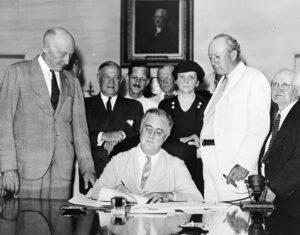CONVERSION TO THE WORLD
A sermon by the Rev. Charles Hoffacker
John 4:5-42
The woman who encounters Jesus at the well
ends up converted.
She sees everything differently than she did before.
Moreover, she contributes to the conversion
of many of her neighbors in Sycar.
They come to see everything differently than they did before.

At first they accept the woman’s testimony;
she’s convincing.
Once they meet Jesus,
they no longer depend on her testimony.
They have seen for themselves.
What we have here is a story of conversion
with this anonymous woman from Sychar
as a principal character.
This story leads me to tell you
of another conversion, a far more recent one,
that centers on a different woman.
Her name was Frances Perkins,
she lived from 1880 to 1965,
and as FDR’s Labor Secretary
she was the first woman to serve
in a presidential cabinet.
She was also one of the most influential cabinet secretaries
in American history,
rightly referred to as
“the woman behind the New Deal.”
I’m glad to talk to you about
one of the greatest women in our nation’s history
who was also a devout Episcopalian
throughout her adult life.
In 2009, the Episcopal Church established
an annual May 13 feast day for Frances Perkins
recognizing her as a public servant and prophetic witness.
Her story is an American story, a Christian story,
an important and inspiring chapter
in the history of us all.
Just as the woman of Sychar
had her encounter with Jesus
and bore effective witness to her neighbors,
so I believe that anyone can experience conversion,
perhaps several conversions over the course of a lifetime.
We can be converted to God, to Christ, to the Church,
to the Bible, to the sacraments, to the poor,
and in other ways.
Frances Perkins had her conversions as well.
There’s one of them
I want especially to bring to your attention,
a conversion that was less a turning around
from one direction to its opposite,
than it was the drastic deepening
of a commitment already in place,
at least in a preliminary form.
This was what I call a conversion to the world.
An important moment
in this conversion to the world
took place on March 25, 1911,
which Frances Perkins
came to call
the day the New Deal was born.
At that time, Frances was thirty years old,
not yet married,
and studying for a Master’s degree at Columbia University.
She worked for her friend and mentor Frances Kelly
as head of the New York office
of the National Consumers League.
The focus of the League was to oppose the harsh,
unregulated working conditions that many Americans
were forced to endure.

who lived on Washington Square in Manhattan.
The guests were just sitting down to tea
when fire whistles and shouts disrupted them.
A big fire was blazing across the square.
Frances saw flames coming out of the ten-story Asch building
where hundreds of workers were employed,
most of them young and impoverished immigrant women.
The building was a crowded, dangerous firetrap
with locked doors.
The firemen on the street
did not have ladders long enough
to make a difference
and many workers fell or jumped to their deaths.
Frances Perkins was deeply shaken
by what she saw.
She knew that almost two years earlier
these workers had been rebuffed and persecuted
for complaining about the conditions
where they worked.
A week after the fire,
she attended a large public meeting
at the Metropolitan Opera House
called by a group of leading citizens.
Rose Schneiderman,
an immigrant trade union leader in her twenties,
gave a historic address,
speaking passionately about the numerous workers
maimed and killed due to horrendous sweat shop conditions.
Frances Perkins took what she heard
as a call to action.
She began to realize
that much more might be required of her
than she had previously imagined.
She recognized that making workplaces safer and more humane
called for an intense, lifelong commitment on her part.
She also saw that the Triangle Shirtwaist fire
could be the starting point
for widespread social change.
So what’s meant by a conversion to the world?
Here the world is not to be taken as either creation
or society organized against God—
as in the old phrase “the world, the flesh, and the devil”—
but rather creation or society as beloved by God
and suffering due to human sin,
as broken and desperate for repair.
Following the Triangle Fire,
Frances lived for more than fifty years
and during that time she acted on
her conversion to the world
in a host of ways,
many of which continue to benefit
people today.
Here are some highlights of her career:
• As factory inspector and later Labor Commissioner
for the State of New York,
she developed and secured passage
of comprehensive labor laws
for workplace health and safety,
making New York a model for other states.
• As United States Secretary of Labor,
Frances Perkins was the driving force behind
many New Deal programs that are still
part of the American social safety net,
amng them Social Security, unemployment insurance,
the 40-hour work week, and minimum wage.
• She also made major contributions
to laws prohibiting child labor,
and that support the rights of workers
to organize into unions for collective bargaining.
• Frances Perkins played a key role
in launching the Civilian Conservation Corps (CCC),
the most popular of the New Deal programs.
The CCC provided jobs for three million unemployed Americans.
• As head of the Immigration and Naturalization Service,
Perkins was a persistent champion for refugees
fleeing Nazism in Germany and Eastern Europe,
despite the opposition she encountered
from many sectors in American society.
• Following her twelve years as Labor Secretary,
she served on the U.S. Civil Service Commission,
then taught at Cornell University
at the newly formed School of Industrial and Labor Relations.
Raised in the Congregational Church,
Frances became an Episcopalian as a young adult,
and was active in a series of parishes throughout her life
depending on where she lived.
During her Washington years, she spent a day every month
in prayerful retreat at an Episcopal convent.
Donn Mitchell is a friend of mine
who serves with me on the board of the Frances Perkins Center.
Some years ago,
he published an enlightening essay entitled
“Frances Perkins and the Spiritual Foundations
of the New Deal.” 1
He noted that Perkins,
in advocating for the Social Security Act
before Congress in 1935,
acknowledged that it represented
a departure for Americans
and did so in two ways.
The Puritans,
influential in the early history of America,
understood the church in congregational terms,
and as a result,
Americans originally understood
their community in local terms.
Thus, in early America,
social welfare needs came to be seen
as a local responsibility.
In the New Deal view,
people in Maine and California,
New York and Texas,
were all neighbors to each other.
The nation was a community,
and social well-being
was a matter of national concern.
Francis Perkins also acknowledged
that Social Security represented
a departure for Americans
in a second, even more significant way.
The Puritans frequently represented God
as an angry and judgmental deity,
and thus their society
was a judgmental one.
Frances Perkins grew up
in an environment
where poverty was dismissed
as largely a failure in personal responsibility
and worldly success seen as a proof of virtue.
The New Deal implicitly challenged
these inherited, often unconscious beliefs
in favor of a gracious society
made in the image of a gracious God.
This challenge replaced
a politics of isolation
with a politics of solidarity.
I invite you to consider at your leisure
whether Frances Perkins
may have had a leading role
in moving America in the direction
of becoming a nation of neighbors
and a gracious society
that reflects a gracious God.
If she contributed in those ways,
then she was not only a devout Christian,
but also an effective public theologian.
Furthermore,
I invite us all to welcome
our own repeated and deepening conversions,
including conversion to the world.
As many of the people of Sychar
heard and heeded the witness
of a woman who had met Jesus
at a well one day at noon,
so may we allow ourselves
to be converted and reconverted.
One factor in this can be the example
of a woman named Frances Perkins.
Through her persistent efforts,
God did much and still does much
to benefit the people of this land
and transform our nation
into a more gracious society.
# # #
[1] Christopher Breiseth and Kirstin Downey, eds., A Promise to All Generations: Stories and Essays about Social Security and Frances Perkins (The Frances Perkins Center, 2011), 43-58.




